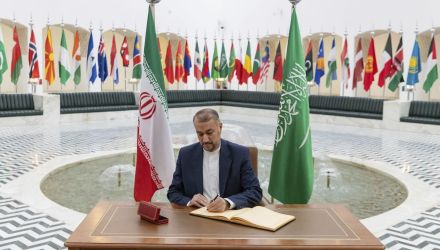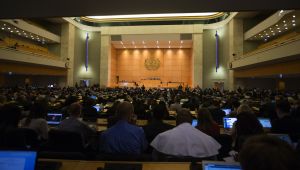For two long years, the US administration here had kept the midnight oil burning, its officials bravely warding off attacks from non-proliferation ayatollahs and at the same time harping, with a passion rarely witnessed in diplomacy, on the advantages of forging a civil nuclear agreement with India. But now, as the nuclear deal flounders under pressure from the Left, and with Prime Minister Manmohan Singh belatedly awakened to the cruel compulsions of coalition politics, officials in the Bush administration are venting their frustration in private.
No one's willing to go on record but former ambassador Teresita Schaffer, now at the Center for Strategic and International Studies (CSIS), articulates the disappointment: "You can't imagine the long hours senior government people have put in, the abuse they have endured from opponents of the deal on our side, in an effort to put in place the item that many successive Indian governments have told us was the thing India most wanted from the US: an end to its 'nuclear pariah' status." She says the US has held up its end of the deal—it changed its law, negotiated an agreement to India's tremendous benefit, and was going to shepherd it through the US Congress once again. "We all understand that India has its own democratic process which can dish up unpleasant surprises. But this is a tough one," she says candidly.
Echoing Schaffer is her colleague at CSIS, Robert Einhorn, a former assistant secretary of state for nonproliferation. "The Bush administration is very frustrated over this turn of events. It feels, correctly, that it made most of the major concessions and took significant political risks to seal the deal, only to find that its partner couldn't deliver on what was seen by many in the US as a one-sided bargain in favour of India," Einhorn told Outlook.
The gloomy mood has enveloped not only American officials and analysts but even Indian Americans, some of whom expended their time, energy and money to sell the nuclear deal to doubting members of Congress. "To say that I am disappointed is an understatement," says Swadesh Chatterjee of North Carolina, who put his career on hold for the past two years for the agreement. "We have been betrayed by the UPA." The community, he says, will now think ten times before sacrificing its time and money for India again. Democratic fund-raiser Sunil Puri didn't anticipate "this nonsense" in India. "Way too many people have invested way too much to just walk away from this deal," he says."This is not a jet ski, it's an ocean liner. It will take some time to turn this relationship around."
The bitterness in the Indian community is palpable and they aren't mincing words. Bharat Barai of Munster, Indiana, who too worked for the deal, says, "I feel the Indian government should have done its homework and political calculations before embarking on such a monumental task," he complains. "It should have built a consensus."
Ironically, this bitterness has also spawned some form of hope, however unrealistic it may sound to people back home. Arguing that the 123 Agreement would not have been taken up by Congress until the spring, Democratic fundraiser Ramesh V. Kapur in Massachusetts says, "Hopefully by then there will be some movement in India." He still doesn't believe the Congress party will succumb to Left pressure. "They are just buying some time. This is a face-saving gesture for the Left," he says. Adds Ashok Mago of Texas, "The deal can be saved if ideology takes a backseat and national interest becomes the main consideration."
So, are these just typical voices of those who can't reconcile themselves to all the wasted effort? More importantly, is the deal dead? Bruce Riedel, who served as senior director for Near East and South Asian Affairs on the National Security Council and is now at the Brookings Institute, contends the deal "is not dead but is clearly in deep trouble and probably will be in cold storage for some time to come, perhaps until 2009." He believes the combination of Indian politics and a lame-duck president in Washington makes it very difficult, although not impossible, to move it forward in the next year. Ditto Xenia Dormandy who, as director for South Asia at the National Security Council, played a key role coordinating Manmohan Singh's July 2005 visit to Washington (which produced the Indo-US nuclear agreement). Now at Harvard University, Dormandy is optimistic, "The only question is whether it is in early 2008 or after a new US administration in 2009," she says, adding a rider that it will require the Indian PM to use all his political equity to face down the Left parties.
Ultimately, whether the deal is dead or not depends on how 'dead' is defined. Most analysts feel a new administration in 2009, particularly if it is Democratic, won't invest as much time and energy as President Bush has done to push the nuclear deal. There's also the danger of the new administration tagging extraneous issues to the deal and effectively killing it. This is why Einhorn advocates pragmatism—shelve the deal and move ahead with the many dynamic and mutually beneficial elements of the relationship that are not so politically fraught. At the Henry L. Stimson Center, Michael Krepon, another long-time critic of the deal, contends: "Ambitious initiatives that are not well thought through usually backfire."
True, the Bush administration hasn't yet given up hope. Einhorn feels that by downplaying the UPA government's decision to put the deal on hold, the Bush administration is clearly hoping it can be resurrected. But he isn't optimistic about this strategy. Ron Somers, president of the US-India Business Council (USIBC), which too helped to sell the nuclear deal here, counters this by saying, "We should not expect instant gratification." Somers is also worried that the floundering deal could have an inimical impact in other sectors. "Any permanent setback where India chooses to remain in nuclear isolation would transmit a confusing signal that will deter investment inflows to an area where India needs it most—in infrastructure," he predicts.
Karl Inderfurth, a former assistant secretary of state for South Asian affairs and now at George Washington University, is among those who feel the deal can be resurrected and concluded by early 2008.Even if there's a delay, he argues, it may only "slow the current momentum in our relations, it certainly will not bring it to a screeching halt". He recalls a 1998 meeting in New York between then PM I.K. Gujral and president Bill Clinton. The Indian leader expressed regret about having "let too many opportunities to deepen our relations go by". Inderfurth adds, "We shouldn't let this happen again."
The full text of this publication is available via Outlook India.




